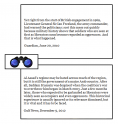The Freeland motif
[ by Charles Cameron — how those first seen as liberators may later be seen as oppressors ]
.
I was reading up on Ian Freeland, the husband of my mother’s first cousin and lifelong best friend, in search of some details on his role in The Troubles in Northern Ireland, and ran across his comment on liberators who become oppressors, which rang a bell or two. That was a couple of days ago, and I found the same basic pattern mentioned in a post today on Gulf News:
FWIW, Ian Freeland’s previous experiences would have been with the Mau Mau in Kenya and in Cyprus during the Makarios days.
**
So the purpose of this post would be to raise the question: how far back can we trace this observation, and what are the memorable examples (a) of people saying it, and (b) of events bearing it out?


Charles Cameron:
December 11th, 2012 at 7:00 pm
I don’t know how it happens, but it happens from time to time that comments are “off” on one of my posts. This is never my intention, and my thanks to Scott McWilliams for pointing it out in this case. Yes indeed, I am hoping for comments here — and yes, I have now enabled them. This should be the default, and I don’t know what quirk or quark of fate ever arises to reset the damn thing.
.
In any case, if you ever see a post of mine with comments disabled, please let me or Zen know, okay?
Scott:
December 11th, 2012 at 7:07 pm
You’re welcome!
I don’t know if it’s the first occurrence, but the Jews invited the Romans in, and the Romans didn’t leave after. At first they were liberators, then oppressors, and later, they were the destroyers…
L. C. Rees:
December 11th, 2012 at 8:29 pm
One example of the top of my head, though I’m sure there are previous examples:
From 2 Kings:
“5 Then Rezin king of Syria and Pekah son of Remaliah king of Israel came up to Jerusalem to war: and they besieged Ahaz, but could not overcome him.
6 At that time Rezin king of Syria recovered Elath to Syria, and drave the Jews from Elath: and the Syrians came to Elath, and dwelt there unto this day.
7 So Ahaz sent messengers to Tiglathpileser king of Assyria, saying, I am thy servant and thy son: come up, and save me out of the hand of the king of Syria, and out of the hand of the king of Israel, which rise up against me.
8 And Ahaz took the silver and gold that was found in the house of the Lord, and in the treasures of the king’s house, and sent it for a present to the king of Assyria.
9 And the king of Assyria hearkened unto him: for the king of Assyria went up against Damascus, and took it, and carried the people of it captive to Kir, and slew Rezin.”
Judah, under Hezikiah, Ahaz’s son, suffered the buyers remorse.
Justin Boland:
December 11th, 2012 at 9:01 pm
Is it fair to say this is really a statement about human learning? The “liberator” meme has always been ad copy, and “oppression” is the inevitable result of armed men taking control of foreign territory. If you hit someone in the face long enough, they always realize you’re hitting them in the face. This, I take as a hopeful sign for the human race.
Charles Cameron:
December 11th, 2012 at 10:26 pm
Scott writes:
That, enhanced by religious considerations, was bin Laden’s complaint about the Saudis letting US troops into the land of the two mosques, no? — and hence the trigger for his declaration of war.
zen:
December 12th, 2012 at 2:39 am
Ah, Charles but the “Land of the Two Mosques” where infidels are forbidden was always the Hejaz, not the old Sultanate and Ottoman Sanjak of Nejd , which is where US troops were. Even under the Sharifs of Mecca, in the Hejaz the ban was only enforced for Mecca and Medina proper. Bin Laden’s argument of extension to apply the ban all of KSA was a novelty that would have startled Abdul Aziz ibn Saud.